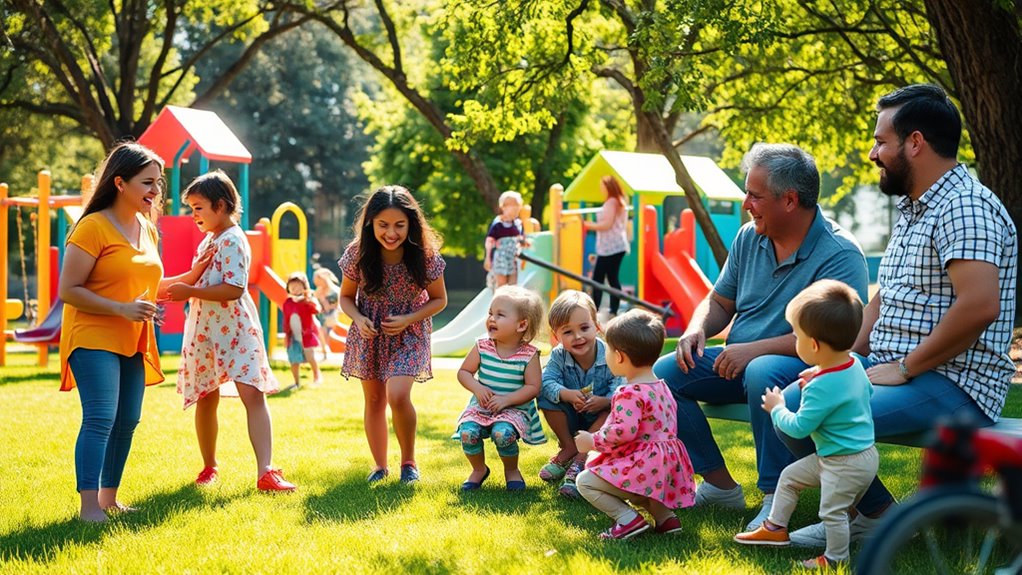Parenting Tips That Will Make You the Talk of the Playground!
To be the talk of the playground, engage your kids in creative play like imaginative storytelling or artsy crafts; it sharpens their social skills and boosts self-expression. Organize fun group activities, such as treasure hunts or obstacle courses, to encourage teamwork and problem-solving. Foster inclusive friendships by promoting games that invite participation from all abilities—empathy and respect are key. Share valuable parenting resources with fellow parents to create a supportive community. Finally, lead by example; demonstrate positive communication and healthy habits. Your active involvement will certainly spark conversations, and there’s even more valuable advice to explore!
Key Takeaways
- Organize engaging group activities like treasure hunts or obstacle courses to foster teamwork and make playdates memorable.
- Encourage inclusive games that allow all children to participate, promoting empathy and acceptance among peers.
- Lead by example with positive communication and healthy lifestyle choices, inspiring children to adopt similar behaviors.
- Create cozy storytelling corners for imaginative play, enhancing cognitive skills and sparking creativity among friends.
- Share parenting resources and book recommendations with other parents to foster community and encourage collaboration.
Engage in Creative Play
Creative play is a powerful tool for child development. By engaging in activities like imaginative storytelling and artsy crafts, you can foster your child’s cognitive, emotional, and social skills. When you encourage your little one to create their own narratives, you’re helping them develop critical thinking and problem-solving abilities. Try setting up a cozy storytelling corner with props and costumes. This invites your child to dive into different roles and scenarios, enhancing their creativity and communication skills.
Artsy crafts complement this imaginative play beautifully. Gather supplies like paper, paints, and recycled materials, and let your child’s creativity flow without restrictions. Whether they’re constructing a rocket ship or painting a landscape, these activities promote fine motor skills and boost self-expression.
Organize Fun Group Activities
Organizing fun group activities can significantly enhance your child’s social development and teamwork skills. One exciting way to do this is by setting up a treasure hunt. Kids love the thrill of searching for hidden treasures, and you can easily customize the hunt to suit their interests. Create clues that encourage problem-solving and collaboration, fostering a sense of accomplishment when they finally uncover the prize.
Another excellent option is to design an obstacle course. Use everyday items like cones, hula hoops, and jump ropes to create challenges that promote physical activity and teamwork. Children can work together to navigate the course, cheering each other on and learning to communicate effectively.
Both activities not only keep kids engaged but also help them develop vital social skills, such as sharing, cooperation, and conflict resolution. Plus, they’ll have a blast! So, gather your child’s friends, unleash your creativity, and watch as they bond and grow through these fun experiences. By organizing treasure hunts and obstacle courses, you’ll not only be the talk of the playground but also a key player in your child’s social development.
Foster Inclusive Friendships
Building on the excitement of group activities, fostering inclusive friendships is a vital aspect of your child’s social development. When you encourage your child to engage in friendship circles that embrace diversity, you help them learn empathy and acceptance. Start by introducing inclusive games that invite all children to participate, regardless of their abilities or backgrounds.
Consider activities that require teamwork and communication, such as relay races or scavenger hunts, where each child’s unique strengths can shine. These games not only promote collaboration but also build a sense of belonging among participants.
Model inclusive behavior by celebrating differences and encouraging your child to reach out to classmates who may feel left out. Teach them the importance of inviting others to join in and recognizing when someone might need support.
Additionally, discuss the value of friendship with your child. Help them understand that true friendship is about kindness, respect, and inclusivity. By fostering a culture of acceptance, you empower your child to build meaningful relationships that extend beyond the playground. Your efforts in nurturing inclusive friendships will lay the groundwork for their future social interactions, creating a stronger, more connected community.
Share Parenting Resources
Parenting can be a rewarding yet challenging journey, and having the right resources at your fingertips can make all the difference. By sharing valuable parenting resources, you not only enhance your own knowledge but also empower fellow parents in your community.
Start with book recommendations that resonate with your parenting style. Classic titles like “The Whole-Brain Child” offer insights into child development, while “How to Talk So Kids Will Listen” provides practical communication strategies. Share these with friends or organize a book club to discuss them, fostering deeper connections.
Don’t underestimate the power of online communities. Platforms like Facebook groups or parenting forums allow you to connect with others who share your experiences and challenges. Engaging in these spaces can provide you with fresh perspectives, tips, and support.
Encourage others to share their favorite resources, too. By creating a culture of resource-sharing, you build a network of informed parents who can navigate challenges together. Remember, no one has to parent alone, and the right tools can make all the difference in your journey. So, start sharing and watch your playground conversations evolve!
Lead by Example
Leading by example is one of the most powerful tools you have as a parent. Your kids are always watching, so make sure you’re demonstrating the behaviors you want them to adopt. When you role model positive behaviors, you lay a solid foundation for their development. Here are four key areas where your actions can speak louder than words:
- Communication: Use kind words and active listening. Show them how to express feelings respectfully.
- Health: Prioritize healthy eating and regular exercise. Your habits can inspire them to make better choices.
- Problem-Solving: Approach challenges with a positive attitude. Show them how to tackle obstacles rather than shy away.
- Empathy: Demonstrate compassion and understanding towards others. Teach them the importance of helping and supporting those in need.
Frequently Asked Questions
How Do I Handle Conflicts Between My Child and Others?
When conflicts arise between your child and others, encourage conflict resolution through open dialogue. Teach them peer mediation techniques, helping them express feelings and find common ground, fostering understanding and lasting friendships in the process.
What Age Is Appropriate for Structured Playdates?
When it comes to structured playdates, think of a garden blossoming; around age three, children start developing social skills and understanding playdate etiquette. At this age, guided interactions help nurture friendships and cooperative play.
How Can I Encourage My Child’s Independence?
To encourage your child’s independence, foster self-help skills by letting them choose their clothes or snacks. Promote decision-making by presenting options, allowing them to weigh choices, and discussing outcomes, boosting their confidence and autonomy.
What Are Effective Ways to Set Boundaries?
Effective boundary setting involves clear communication and consistency. You’ll want to explain expectations, enforce rules calmly, and use effective discipline techniques like natural consequences to foster respect and understanding in your child.
How Do I Manage My Own Stress as a Parent?
Managing your stress as a parent involves practicing mindfulness techniques and implementing self-care strategies. Take time for yourself, breathe deeply, and engage in activities you love. Prioritizing your well-being helps you thrive and supports your family.




